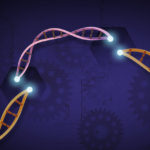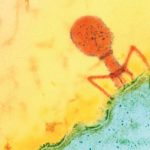UC Berkeley and Berkeley Lab scientists have expanded the CRISPR gene-editing toolkit with the addition of a new, compact CRISPR-associated (Cas) protein—the RNA-guided “scissors” that snip DNA—and a modification of the Cas9 protein to give it an “on” switch for better control.
Megaphages Discovered in Human Gut Bacteria
While sequencing gut bacteria from people in Bangladesh, Berkeley Lab’s Jillian Banfield discovered phages, viruses that infect and reproduce inside bacteria, twice as big as any previously found in humans. She and her colleagues found the snippets of megaphage DNA in a CRISPR segment of one type of bacteria, Prevotella, that is uncommon in people eating a high-fat, low-fiber Westernized diet. Banfield and her team named the clade of megaphages “Lak phage” after the Laksam Upazila area of Bangladesh where they were found.
Impact of Environmental Changes on Microbes in Arctic Soils
As the Arctic continues to warm at about twice the rate of the rest of the world, scientists expect its frozen soils—known as permafrost—to thaw, activating microbes capable of decomposing soil and releasing carbons and other nutrients to the atmosphere and water. Berkeley Lab scientists in the Earth and Environmental Systems Area (EESA), led by microbial ecologist Neslihan Taş, set out to learn more about how Arctic soil microbes can contribute to greenhouse gas emissions under a warming climate. Taş’s research team collaborated with Susannah Tringe, Deputy for User Programs at the Joint Genome Institute (JGI), to conduct their study, funded by the Department of Energy’s Office of Biological and Environmental Research (BER). The results were published in Nature Communications.
Was this page useful?






